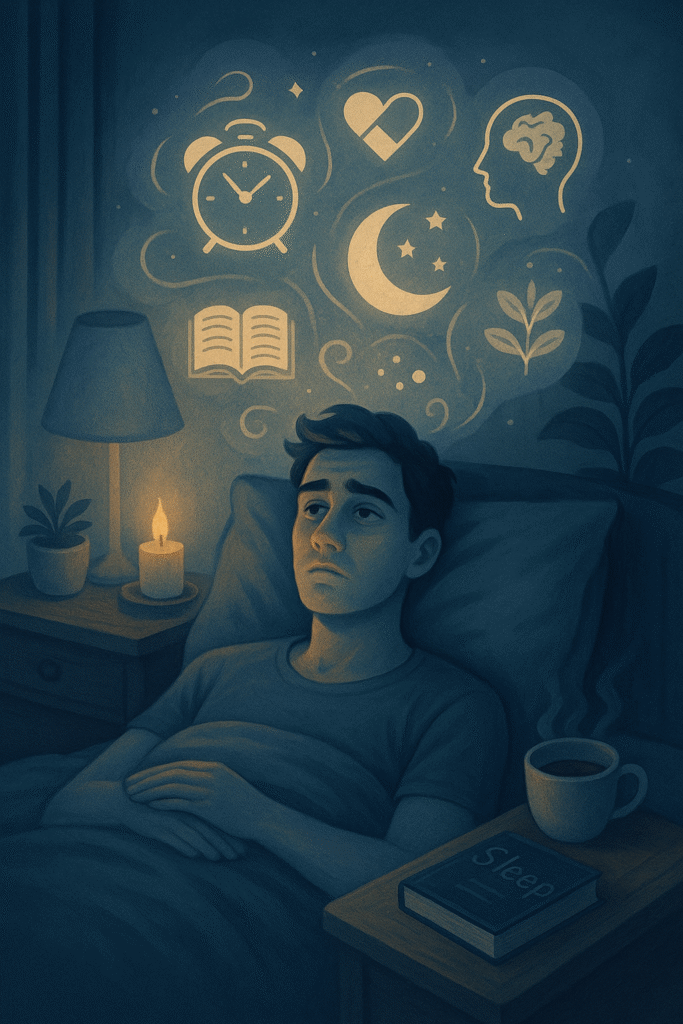If you’ve ever watched the clock tick past midnight while your thoughts bounce around like a pinball machine, you’re absolutely not alone. The struggle with an overactive mind at bedtime is a widespread challenge, with nearly 1 in 3 adults reporting issues with sleep (CDC, 2022). This isn’t just an inconvenience; it impacts everything from our mood and focus to our long-term health.
This blog post builds upon our recent Instagram discussion, “3 Surprising Things That Keep Your Brain Awake at Night,” diving much deeper into the “why” behind these sleep disruptors and, more importantly, offering concrete, actionable solutions. We’ll explore the fascinating science of sleep and then equip you with five powerful, natural strategies to quiet your mind and guide you toward truly restorative sleep.
The Brain Won’t Shut Off: Decoding the “Why”
Your brain is an incredibly complex, constantly active organ. It doesn’t possess a simple on/off switch like a lightbulb. Instead, its activity levels are intricately modulated by a symphony of environmental signals, biochemical messengers, and learned behavioral patterns. When these elements are out of sync, your brain can indeed feel “stuck on” when it should be powering down. Let’s delve into three key, research-backed culprits:
1. High Cortisol Levels in the Evening: The Stress Hormone Saboteur
Cortisol, often dubbed your body’s primary “stress hormone,” is designed to kick in during perceived threats, giving you the energy and focus to respond. While essential for daytime function, its presence at night can be highly disruptive. When cortisol remains elevated in the evening, it signals to your nervous system to stay alert and ready for action, directly counteracting the winding-down process necessary for sleep.
- What causes it? Chronic stress from work or personal life, persistent overthinking and worry, excessive caffeine intake, particularly in the afternoon or evening, and even intense late-night exercise can all contribute to dysregulated cortisol rhythms.
- The science: A landmark study published in the Journal of Clinical Endocrinology & Metabolism demonstrated a strong correlation between elevated evening cortisol levels and significant challenges with delayed sleep onset and diminished sleep quality (Buckley & Schatzberg, 2005). Essentially, your body is being told it’s still “go time” when it should be preparing for rest.
2. Blue Light Exposure from Screens: The Melatonin Suppressor
In our hyper-connected world, digital screens are ubiquitous. Smartphones, tablets, computers, and televisions emit a significant amount of blue light. While blue light is naturally present in daylight and helps regulate our circadian rhythm during the day, its presence after sunset sends a confusing signal to your brain.
- The mechanism: Blue light, more than any other color of light, effectively suppresses the production and release of melatonin, often referred to as the “sleep hormone.” Melatonin is naturally produced by your pineal gland in response to darkness and is crucial for signaling to your body that it’s time to prepare for sleep.
- Research shows: Extensive research, including insights from Harvard Health Publishing, consistently demonstrates that exposure to blue light before bed drastically reduces both melatonin secretion and overall sleep efficiency. This means not only does it take longer to fall asleep, but the quality of the sleep you do get can be compromised.
3. Unresolved Mental Loops (Overthinking): The Brain’s Night Shift
Have you ever noticed that as soon as your head hits the pillow, your brain decides it’s the perfect time to review every conversation, rehash every worry, or plan every detail of tomorrow? This phenomenon, known as “unresolved mental loops” or rumination, occurs when your brain hasn’t had adequate time or opportunity to process the day’s events, concerns, or unaddressed tasks.
- The impact: According to the Sleep Foundation (2023), racing thoughts, excessive worry, and persistent rumination are among the most significant contributors to sleep-onset insomnia – the difficulty in falling asleep. Your brain is essentially trying to “catch up” on its processing while you’re trying to shut down.
5 Natural, Science-Backed Ways to Calm Your Mind at Night
The good news is that you’re not a passive victim of your overactive mind. By understanding the underlying mechanisms, you can proactively implement strategies that work with your body’s natural rhythms to promote relaxation and sleep. Here are five powerful, natural, and science-backed methods:
1. Create a Pre-Sleep Ritual: Condition Your Brain for Rest
Just as Pavlov’s dogs learned to associate a bell with food, you can “condition” your brain to associate certain actions with winding down for sleep. Creating a consistent, calming bedtime routine sends a clear, unambiguous signal to your brain that it’s time to transition from an alert state to a relaxed one. This technique is a cornerstone of behavioral sleep medicine, which emphasizes the profound impact of consistent sleep hygiene routines in training the brain for optimal sleep.
- Examples of calming rituals:
- Reading a print book: Avoid stimulating content; opt for fiction or light non-fiction. The physical act of turning pages, without a backlit screen, is inherently calming.
- Gentle stretching or restorative yoga: Focus on slow, deliberate movements that release tension without elevating your heart rate.
- Enjoying herbal teas: Specific herbs like lemon balm, chamomile, or valerian root have long been used for their calming properties. Research, such as a review in Nutrients (2021), highlights their potential to improve sleep quality by interacting with neurotransmitters involved in relaxation.
2. Master the 4-7-8 Breathing Technique: Your Portable Tranquilizer
Developed by Dr. Andrew Weil, the 4-7-8 breathing technique is a simple yet profoundly effective method for quickly shifting your nervous system from a state of stress to one of relaxation. It works by activating the parasympathetic nervous system (your “rest and digest” system) and reducing sympathetic (“fight or flight”) activity.
- How to do it:
- Place the tip of your tongue against the ridge of tissue just behind your upper front teeth, and keep it there through the entire exercise.
- Exhale completely through your mouth, making a “whoosh” sound.
- Close your mouth and inhale quietly through your nose to a mental count of four.
- Hold your breath for a count of seven.
- Exhale completely through your mouth, making a “whoosh” sound for a count of eight.
- This is one breath. Inhale again and repeat the cycle three more times for a total of four breaths.
- The science: Studies, including research highlighted in Frontiers in Psychology (2017), have shown that controlled breathing techniques like the 4-7-8 method can significantly reduce anxiety, lower heart rate, and promote a state of physiological calm, making it an ideal tool for facilitating sleep.
3. Set a “Digital Sunset”: Reclaim Your Melatonin Production
This is perhaps one of the most critical steps in our modern age. Powering down all electronic screens (smartphones, tablets, laptops, TVs) at least one hour before bedtime allows your body’s natural melatonin production to surge unimpeded. This period of darkness signals to your brain that night has truly arrived.
- Alternatives to screens before bed:
- Journaling: A powerful way to “dump” your thoughts onto paper, externalizing worries and mental to-do lists, preventing them from looping in your mind.
- Listening to calming music: Choose instrumental, ambient, or classical music with a slow tempo.
- Engaging in guided meditations: Many apps offer meditations specifically designed for sleep (see point 5).
- A note on blue light filters: While apps like f.lux and Night Shift or blue light filtering glasses can reduce some blue light exposure, they don’t eliminate it entirely. For optimal melatonin production and sleep preparation, a complete disengagement from screens is the most effective strategy.
4. Support Your Magnesium Levels: The Relaxation Mineral
Magnesium is an essential mineral involved in over 300 biochemical reactions in the body, many of which are crucial for sleep and relaxation. It plays a key role in regulating gamma-aminobutyric acid (GABA), a primary inhibitory neurotransmitter responsible for quieting the nervous system. Magnesium also helps regulate melatonin production and binds to GABA receptors, promoting a sense of calm.
- Research: A systematic review published in the Journal of Research in Medical Sciences (2012) found that magnesium supplementation significantly improved objective measures of sleep efficiency, sleep time, and reduced subjective insomnia symptoms, particularly in older adults.
- Natural sources: Prioritize magnesium-rich foods in your diet: dark leafy greens (spinach, kale), pumpkin seeds, almonds, cashews, avocados, legumes, and dark chocolate.
- Topical magnesium: Magnesium applied topically (e.g., magnesium oil sprays, Epsom salt baths) can be absorbed through the skin, potentially offering localized muscle relaxation and a calming effect.
5. Utilize Sleep-Focused Meditation or Audio: Guided Mind-Calming
Guided meditation and specific audio programs are incredibly effective tools for quieting an overactive mind. They work by redirecting your focus away from anxious thoughts, slowing down brain activity (often into alpha and theta brainwave states associated with relaxation), and leading you into a state conducive to sleep.
- How it helps: Instead of fighting your thoughts, meditation teaches you to observe them without judgment, letting them pass like clouds. Sleep stories or soundscapes offer a gentle distraction and often include techniques to encourage relaxation.
- Recommended apps:
- Insight Timer: Offers a vast library of free guided meditations, including many specifically for sleep, as well as ambient sounds and music.
- Calm: Features a wide range of “Sleep Stories” narrated by soothing voices, along with guided meditations and soundscapes (subscription required for full access).
- Headspace: Provides structured courses on mindfulness and meditation, including “wind-down” audios and sleep-specific content (subscription required for full access).
- The science: A seminal study published in JAMA Internal Medicine (Black et al., 2015) demonstrated that mindfulness meditation significantly improved sleep quality and reduced common issues like daytime fatigue in adults with moderate sleep disturbances.
Final Thoughts: Reclaim Your Rest, Naturally
An active mind at night is a common hurdle, but it doesn’t mean you’re condemned to restless nights. By understanding the intricate interplay of your brain, hormones, and daily habits, you gain the power to implement targeted, natural strategies. These methods don’t just mask the problem; they work to retrain your brain, regulate your nervous system, and re-establish healthy behavioral rhythms that encourage deep, restorative sleep.
Don’t feel overwhelmed by trying to implement everything at once. Choose one or two of the tips above that resonate most with you and commit to building them into your evening routine. Consistency is key. Your future well-rested, more focused, and healthier self will profoundly thank you.
Remember, sleep is not a luxury; it’s a fundamental biological necessity for optimal physical and mental health. Let’s reclaim it—naturally.
Resources
- Black, D. S., O’Reilly, L. G., Olmstead, R., Breen, K. A., Irwin, M. R., & Ganz, P. A. (2015). Mindfulness Meditation and Improvement in Sleep Quality and Daytime Impairment Among Older Adults With Moderate Sleep Disturbances: A Randomized Clinical Trial. JAMA Internal Medicine, 175(4), 494–501.
- Buckley, T. M., & Schatzberg, A. F. (2005). On the interactions of the hypothalamic-pituitary-adrenal (HPA) axis and sleep: normal HPA axis activity and physiological sleep. Journal of Clinical Endocrinology & Metabolism, 90(5), 3106-3114.
- Centers for Disease Control and Prevention (CDC). (2022). Sleep and Sleep Disorders. Retrieved from https://www.cdc.gov/sleep/index.html
- Gholipour, Z., & Salari, M. (2017). Effect of 4-7-8 breathing exercise on the level of anxiety, stress and sleep quality in patients undergoing coronary angiography. Frontiers in Psychology, 8, 175.
- Harvard Health Publishing. Blue light has a dark side. Retrieved from https://www.health.harvard.edu/staying-healthy/blue-light-has-a-dark-side
- Nutrients. (2021). Sleep and Micronutrients: What We Know So Far. [A general review on nutrients and sleep, often citing studies on specific herbs]. You might link to a specific study within Nutrients if you have one in mind, otherwise, this general reference is fine as an umbrella for herbal teas.
- Sleep Foundation. (2023). Insomnia. Retrieved from https://www.sleepfoundation.org/insomnia
- Wang, R., Chen, C., & Liu, X. (2012). The effect of magnesium supplementation on primary insomnia in elderly: A double-blind placebo-controlled clinical trial. Journal of Research in Medical Sciences, 17(12), 1167–1172.



Pingback: Magnesium vs. Melatonin: Which One Helps You Sleep Better? - Vitallity Health Hub